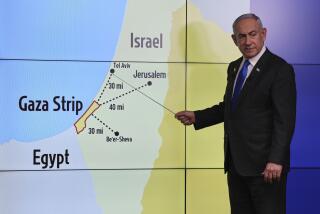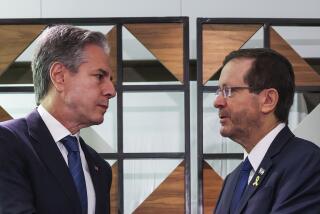Mideast Deadlock Brings Risks, Albright Warns
- Share via
WASHINGTON — Stung by complaints from Capitol Hill and American Jewish groups that U.S. peace proposals tilt toward the Palestinians, Secretary of State Madeleine Albright on Tuesday defended the administration’s approach--and warned that a continuation of the Middle East deadlock will damage the security of Israel, the Arab world and the United States.
Albright’s lecture, delivered less than 24 hours before a scheduled meeting here with Israeli Prime Minister Benjamin Netanyahu, was intended to regain the psychological high ground from the Israeli leader, who has mobilized an impressive list of supporters in the U.S. to demand that the Clinton administration ease the pressure on his government.
The Albright-Netanyahu talks are designed to revive the U.S. mediation effort, which foundered over the weekend when Israel rejected a U.S. plan to break the stalemate. Palestinian Authority President Yasser Arafat had already accepted it.
In her speech at the National Press Club, and in meetings with U.S. Jewish leaders and pro-Israel lawmakers, Albright said the U.S. plan is far closer to Israel’s original position than to that of the Palestinians. She gave no indication that she is prepared to change the proposal to overcome Israeli objections.
“The ideas we presented posed some very difficult choices for the Palestinians,” she said. “They were required to make substantial changes in their negotiating position. Nevertheless, Chairman Arafat agreed to our ideas in principle.”
Albright said the Palestinian Authority has already gone a long way to meeting Israel’s demands for a crackdown on terrorism.
“What we’ve seen, especially over the past several months, is a concerted Palestinian effort, even in the absence of an agreement with Israel . . . against those who would threaten peace with terror and violence,” Albright said. “The Palestinian Authority deserves credit for taking on such groups.”
For his part, Netanyahu has scheduled a public relations offensive to demonstrate the extent of his support in the United States. Following his talks with Albright, he will deliver a spate of speeches to pro-Israel organizations, a round of television interviews and appearances before newspaper editorial boards. Israeli officials say his objective is to show that Americans believe that Israel should be the sole judge of its own security.
Albright agreed with that view but said she hopes to persuade Netanyahu that Israel would be far better off in the long run with a durable peace treaty than with a few more slices of West Bank land.
Washington’s peace proposal calls for Israel to turn over to the Palestinians an additional 13% of West Bank land under the terms of the 1993 peace accords negotiated in Oslo and signed on the White House lawn. The accords call for additional land transfers but do not spell out how much territory should be ceded.
Last week, Albright invited Israel and the Palestinians to a summit here to begin negotiations on a final peace treaty--provided that both sides accepted the U.S. plan to settle the interim territorial dispute. Criticizing the U.S. proposal as an ultimatum, Israel refused to go along. Israel has offered to cede an additional 9% of the territory, arguing that anything larger would damage its security by isolating West Bank Jewish settlements.
In her speech, Albright said both Israel and the Palestinians had asked the United States to play a more active role in the negotiations because they were unable to reach agreement by themselves.
“In response primarily to Israeli requests,” she said, “we allowed more time and then more time and then more time for our suggestions to be studied, considered and discussed.
“The leaders of the region have reached a crossroads. Act before it’s too late. Decide before the peace process collapses. And understand that in a neighborhood as tough as the Middle East, there is no security from hard choices and no lasting security without hard choices.”
In Jerusalem, Netanyahu spokesman David Bar-Illan said Israel will not agree to any settlement that it considers a threat to its security.
“Obviously, we’re pleased to hear that the U.S. is not making an ultimatum and that these are ideas only,” Bar-Illan said.
“We’re not talking about fairness,” he said in response to Albright’s assertion that the U.S. plan is fair to both sides. “We’re talking about security, and what may appear unfair to others is for us a matter of life and death.”
Times staff writer Rebecca Trounson in Jerusalem contributed to this report.
More to Read
Sign up for Essential California
The most important California stories and recommendations in your inbox every morning.
You may occasionally receive promotional content from the Los Angeles Times.










